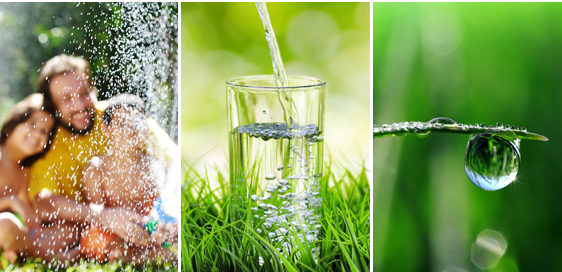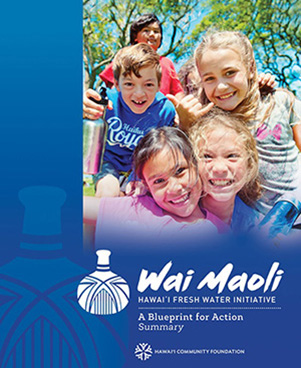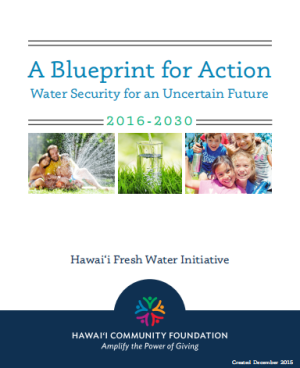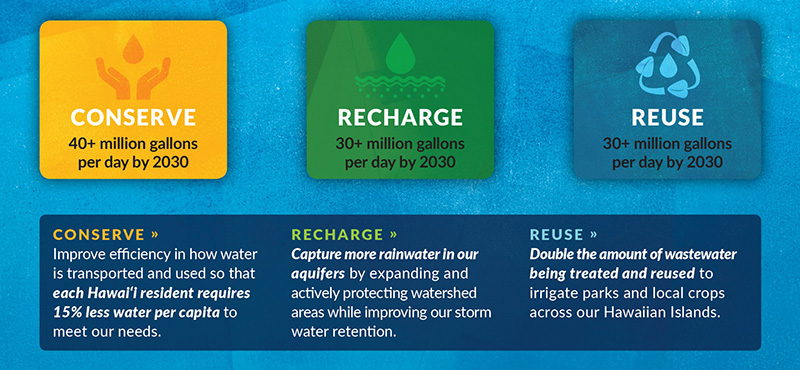
Surrounded by the Pacific Ocean, it’s easy for those of us in Hawai‘i to appreciate that water covers 70% of Earth’s surface. Harder to fathom is the fact that only three percent of the earth’s water is fresh, and less than one percent supports all life on land. The stark difference between “wet” and “dry” sides of our Islands has made water management pivotal in Hawai‘i’s history. Add to that a decrease of rainfall of 18 percent over the last 30 years; a population that has doubled since 1959; record levels of visitors; the reality that half of Hawai‘i’s watershed forests have been destroyed… and the result is a potential fresh water crisis.
Against this uncertain backdrop, HCF created the Wai Maoli: Hawai‘i Fresh Water Initiative in 2013, which is currently supported by a funding partnership of 10 additional funders. The Fresh Water Initiative is designed to pro-actively address and resolve water supply issues. In order to tackle this important issue, HCF invited stakeholders from all sides of the issue — agriculture, private landowners, scientists, and government officials — to convene as a Fresh Water Council (Council).

“We need to sustain and create a culture for us
as a community, appreciating, understanding,
and leading how we manage both our ground water
and freshwater systems in Hawai‘i.”
— KA‘EO DUARTE, COUNCIL CHAIR

The result? A Blueprint for Action with a goal of providing 100 million gallons a day of additional reliable fresh water supply by 2030 via clear solutions that have broad, multiparty support. HCF’s approach and unique position in the community provided the space and structure to bring together the diverse stakeholders, find common ground and ultimately come to agreement.


Unlike many Blue Ribbon Panels that disband after issuing their report, members of the Council have agreed to continue working together to help implement the recommendations. Water, as we know, is essential to life. And collaboration, we’ve found, is essential to protecting our quality of life in Hawai‘i.
To achieve this goal, the council identified three aggressive targets and strategies.

The team approach is already paying off. The Fresh Water Initiative is working to implement a strong, proactive agenda to protect Hawai‘i’s fresh water future, and avoid costly problems down the road. The Blueprint for Action lays a foundation for a sustainable water future for our state. Thus far it has helped support and pass 12 key state and county policy actions that will improve Hawai‘i’s ability to capture, reuse, and store fresh water—making us all a little more secure. Coordinated outreach and capacity building are also underway as implementation of the Fresh Water Blueprint for Action kicks into higher gear. The Blueprint for Action offers Hawai‘i’s decision makers a new vision and clear recommendations for policy changes and actions that have broad, multi-party support.
There are many cautionary tales around the world. In April 2018, Cape Town, South Africa came extremely close to “Water Day Zero” but through aggressive restrictions on personal and agricultural water have bought themselves a bit more time. Other cities like Mexico City, Melbourne, Jakarta, London, Beijing, Istanbul, Tokyo, Bangalore, and the U.S. State of California have all experienced severe water shortages and at current rates global demand is projected to surpass supply by 20301.
1Laudicina, Paul, “Water Day Zero Coming To A City Near You”, Forbes. June 7, 2018.
Funding Opportunities
Water Conservation, Recharge, & Reuse Grants – APPLICATION OPEN!
HCF’s Fresh Water Initiative (FWI) continues its efforts to increase Hawai‘i’s long-term potable water security through water conservation, recharge, and reuse across the state of Hawai‘i. With this grant round, the Initiative is looking to fund water projects that directly support any aspect of the FWI goals, to create 100 million gallons per day (MGD) in additional, reliable fresh water capacity for our islands by 2030. Check out the funding opportunity for more details!
Online Applications are due Thursday, August 15, 2024, 4:00 p.m. (HST)
See Funding Opportunity: Fresh Water Initiative – Water Conservation, Recharge, & Reuse Grants
Application Resources:
Budget Template
Workplan Template
Questions? Please email us at [email protected]. You may also view a recording of a previous informational session at this link. Note that the application due dates referenced in this recording are outdated, please follow the dates provided in the current funding opportunity above.
Hawaiian Islands Environmental Finance Center
In 2023, HCF launched the Hawaiian Islands Environmental Finance Center, a Category 2 – Regional Water Infrastructure EFC with BIL funding, to support long-term water sustainability and water infrastructure resilience across the state of Hawai‘i.
HCF was awarded a $3.2 million dollar grant by the United States Environmental Protection Agency (EPA) to establish this environmental finance center (EFC), which, along with other EFCs across the nation, serves as a vital resource for communities to access federal funding for infrastructure projects that improve public health and environmental protection. This grant is a direct result of the Bipartisan Infrastructure Law (BIL), which delivers more than $50 billion to EPA over five years to improve water infrastructure across the nation, and the HIEFC is committed to assisting partners with identifying and applying for these funding opportunities as they become available.
The Hawaiian Islands Environmental Finance Center (HIEFC) will focus its efforts on supporting nonprofits, community organizations, and government agencies with building their capacity to secure federal funding, as well as strengthening workforce development in the water sector to ensure long-term labor forces in this field.
For more information, visit www.hawaiianislandsefc.org or email [email protected].
See press release: Hawaii Community Foundation Launches State's First Environmental Finance Center
Watch the Fresh Water Initiative featured on Voice of the Sea